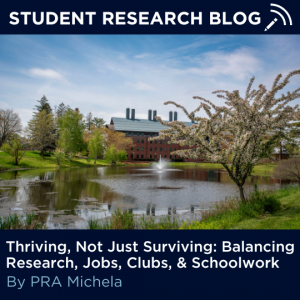By Michela Brown, Peer Research Ambassador
 As a senior in college, I’ve come to know firsthand how overwhelming it can feel to juggle classes, jobs, club commitments, and leadership roles – let alone adding research to the mix. Some days, it seems like there just aren’t enough hours to get everything done, and the pressure to succeed can feel intense. But let me assure you – everything will be okay. The key is finding balance and giving yourself grace along the way. Here are some strategies that have helped me navigate this journey and a reminder that you are not alone.
As a senior in college, I’ve come to know firsthand how overwhelming it can feel to juggle classes, jobs, club commitments, and leadership roles – let alone adding research to the mix. Some days, it seems like there just aren’t enough hours to get everything done, and the pressure to succeed can feel intense. But let me assure you – everything will be okay. The key is finding balance and giving yourself grace along the way. Here are some strategies that have helped me navigate this journey and a reminder that you are not alone.
Time Management is Key
Being a full-time college student while maintaining a social life or working a part-time job requires effective time management. Personally, I use Google Calendar and Notion to plan out my weeks and organize assignments. Google Calendar helps me visualize my daily schedule, from class times to work shifts, club meetings, and dedicated research hours. Meanwhile, Notion allows me to customize templates to track deadlines for assignments, quizzes, exams, and discussion posts. Most importantly, I block out time not only for obligations but also for relaxation and self-care. It may feel like you have to do everything at once, but prioritizing tasks and setting deadlines will help you stay on track without last-minute stress. Trust yourself – you got this!
Communicate with your Research Advisor
Your principal investigator (PI) or research mentor understands that you have other responsibilities. Keeping them informed about your availability and workload is crucial. I recommend sending them your class schedule at the beginning of each semester, so they understand your commitments. If a particularly busy week comes up due to exams or projects, don’t hesitate to communicate that you need some flexibility. Most mentors are incredibly understanding and want to see you succeed in all aspects of your college experience.
Learn to Say No
It’s tempting to take on multiple responsibilities, especially at a large university like UConn, where so many opportunities are available. But remember, you are only one person, and your well-being matters. Before committing to new responsibilities, evaluate whether they align with your goals and if you have the bandwidth to manage them effectively. If something is overloading your schedule, don’t be afraid to say no. Prioritizing what truly matters to you is a form of self-care.
Utilize Campus Resources
UConn has an abundance of resources to support students, and I’ve found that taking advantage of them makes a huge difference. One of my favorite ways to unwind is attending group fitness sessions at the Rec Center. Setting aside an hour of my day to focus on myself – without thinking about school or social obligations – helps me recharge both mentally and physically.
Stay Flexible and Adaptable
Things won’t always go as planned – and experiment might not work, an unexpected deadline may pop up, or a job might require extra hours. That’s okay. Staying adaptable and willing to adjust your schedule as needed can help minimize stress. Setbacks are part of the journey, but they don’t define your success.
Remember to Enjoy the Journey
As I continue to balance senior year research with part-time work, club involvement, and coursework, I understand how tough and tiring it can be. But I also remind myself that these years are an opportunity to grow, explore, and thrive. College isn’t just about checking off accomplishments – it’s about learning, making connections, and finding fulfillment in the process. So, take a deep breath, prioritize what matters, lean on your support system, and give yourself grace. You’re doing great, and you deserve to thrive, not just survive.
Michela is a senior majoring in Biology and minoring in Animal Science and Molecular & Cell Biology. Click here to learn more about Michela.